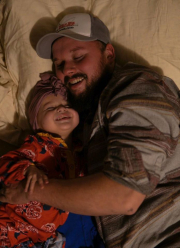Ann Arbor, MI – Just when Rilynn Payne was scheduled to receive a life-altering organ transplant, fate delivered another twist. 
Payne, a 3-year-old from southwest Michigan, had overcome numerous obstacles last year and was on schedule to receive a kidney transplant this year, when the COVID-19 pandemic postponed the procedure.
“It’s always something,” said her grandmother, Heidi Keister. “Now, we are waiting again.”
Rilynn’s mother, Emily, and father, Zack, are used to waiting. Rilynn was born with Autosomal Polycystic Kidney Disease and has been in and out of hospitals all her life. She was diagnosed with the rare disease in the womb, and doctors removed both kidneys when she was seven days old. She’s been on dialysis since then, waiting for a kidney donor.
When they found a match and were ready to proceed with the transplant, they received another round of bad news that they would have to address, first: doctors found cancer in Rilynn’s liver. Now, she would need two organ transplants to save her life. Rilynn underwent 15 rounds of chemotherapy while waiting nine months for a new liver, which was successfully transplanted in June 2019.
After her chemotherapy, the Paynes were told Rilynn had to wait until January to be reevaluated for her kidney transplant. By then, their matched donor was no longer available. Fortunately, they found another, but many people are not as lucky – in Michigan, there are 2,800 people on the organ transplant waiting list. In the U.S., more than 113,000 people are waiting for a life-saving organ, and a new person is added to the list, on average, every 10 minutes.
January brought new hope, but also another setback. Rilynn developed whooping cough, which postponed her kidney transplant yet again, this time to early March. The timetable was tight, because Emily is also expecting a child this month, but the family once again relied on their faith. 
“It’s truly been our faith in God and our family that has kept us all strong throughout this,” said Keister.
Fate would have one more twist, however. Just when things had finally lined up, the COVID-19 pandemic hit Michigan and Rilynn’s transplant was postponed again.
While organ transplants have not completely ceased under Gov. Gretchen Whitmer’s “Stay home, Stay Safe” executive orders, non-critical cases are being evaluated on an individual basis, according to Dorrie Dils, CEO of Gift of Life Michigan, the state’s federally designated organ procurement program. Hospital transplant centers, along with transplant surgeons and patients, weigh the risks and potential benefits.
“The entire hospital atmosphere must be evaluated,” she said, adding that the COVID-19 virus is straining hospital resources. Also, organ transplant recipients usually have weakened immune systems, which may make them more susceptible to the virus.
“Bringing in somebody for a transplant and introducing them to that environment is not ideal,” she said. “Many individuals are being asked to wait out this pandemic at home until the transplant is safer for them.”
 Keister said the family knows they are fortunate to have an eligible donor lined up for when the hospital atmosphere is deemed safe enough to proceed and they continue to put their trust in God as they wait for the final hurdle to fall.
Keister said the family knows they are fortunate to have an eligible donor lined up for when the hospital atmosphere is deemed safe enough to proceed and they continue to put their trust in God as they wait for the final hurdle to fall.
“It’s all we can do right now,” she said. “When you’re fighting for your child you do whatever you can. You do what you have to do. We are just fortunate to have somebody step up to the plate.”
April 19-25 is National Pediatric Transplant Week, which brings awareness to issues facing younger transplant patients. There are more than 1,900 children under the age of 18 on the national organ transplant waiting list, including more than 600 aged 5 or younger. The size of the recipient’s body and the donor organ are taken into account when matching donors to recipients. Very small children most often receive donations from other young people – although older children and adults can also be a good match.
To sign up on the Michigan Organ Donor Registry, visit www.golm.org.







